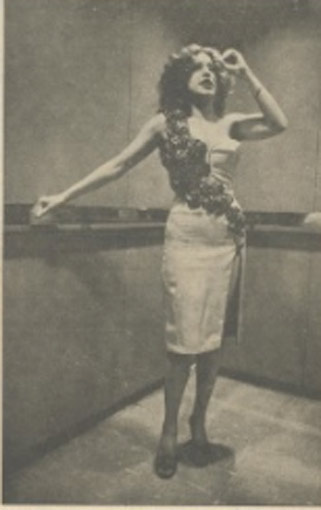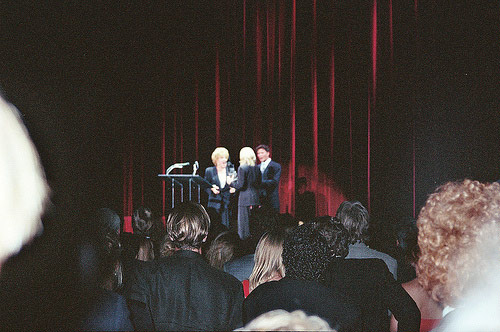HuffPost Multicultural
by Michael Montlack
DIVINING DIVAS: Going Gertrude, Garbo and Gaga Over Powerful Women: How Stevie Nicks (and Another ‘Stephanie’) Unknowingly Propelled My Writing Career
Posted: 06/11/2012 10:27 am
It all began with my friend Stephanie Fairyington, a journalist and editor, who encouraged me to write some prose a few years ago when I was mainly working on poetry. Stephanie loved hearing my stories when we got together and suggested I write a non-fiction piece that she could get to editors at Out and The Advocate for consideration. I took the offer and wrote an essay about Stevie Nicks, sort of deconstructing my intense fascination with her since childhood — how I learned from her cryptic but emotional lyrics to express myself without revealing my ‘secret’ self, how her ghostly veils taught me to be sexually (and safely) vague. This turned out to be a psychological and cultural exercise that got me thinking about the more universal relationship between gay men and their strong (and sometimes vulnerable) female icons.
There was some serious interest in publishing the piece, but I was asked to wait since Stevie had been featured in recent articles in those magazines, one about her music, one her style. (She was having a good year.) But I didn’t want to wait. I was too excited and found myself translating the essay into a poem, which immediately found a home in a journal that was not a gay publication, reinforcing for me that this was a topic that crossed the lines of gender and sexual orientation. All sorts of folks might relate.
So I began approaching the gay writers I knew (and hoped to know), asking if they had divas, if they would write or contribute poems and essays on them. The result was My Diva (University of Wisconsin Press, 2009), which featured the essays only — on everyone from Sappho to Margaret Cho, Queen Elizabeth I to Endora of Bewitched, not to mention the diva jukebox standards: Cher, Bette Midler, Tina Turner, Diana Ross.
So perhaps this phenomenon was broader than I’d thought. It makes sense: Anyone can claim the need for celebrity, for role models, a source of strength that is outside ourselves, from someone seemingly larger than ourselves. Though it is certainly more pronounced in gay men who historically have been shunned by families, religious institutions and popular culture (despite our heavy influence in its direction). It’s not surprising that as a group our need may be greater for such women. After all, they share something with us that is cause for us to so deeply connect with them. Often pioneers in their fields, they frequently paid a price for stepping beyond the lines drawn for them by society, for being successful or loud or strong, when women weren’t supposed to be any of those things. They, like gay men, failed at playing the gender role defined by their time and culture. And they, perhaps like gay men (and gay women), helped to redefine, broaden, and loosen those restrictive roles, which benefits us all.
Gathering and editing the pieces, I saw immediately that although Divas are sometimes reduced in the limelight to their glamorous and outrageous images, they assumed a variety of deeper and more meaningful roles for the men who wrote about them. Sure, there were those connections based primarily on an appreciation of her style and/or attitude, and that certainly can be enough, but more often the “relationships” resembled those of surrogate mothers, imaginary big sisters, political heroes, artistic mentors, goddesses, or alter egos, whatever or whomever that gay boy or man needed in order to survive, grow or move beyond.
For example, in the newly released second installment Divining Divas (Lethe, 2012), we can watch latch-key kid Ruben Quesada finding a “modicum of motherhood” in his television babysitter Oprah Winfrey; Steve Fellner maintaining Miss Piggy’s air of dignity during a session of “pig bottom” sex; Jeffery Conway surviving a break-up by listening to Mary J. Blige, CA Conrad anointing himself with dirt lifted from Emily Dickinson’s yard; D. A. Powell entering “the world through” Donna Summer’s “dryice fog;” B. C. Edwards learning how to flirt with bartenders from Parker Posey; Mike Albo conspiring with Natalie Merchant “to be weird” for the rest of his life; and Joseph Campana taking careful notes from Audrey Hepburn on “How to Be a Star.”
Sample poem from Divining Divas
“And wouldn’t you love to love her?” — Stevie Nicks
By Michael Montlack
platforms
like a mare on thoroughbred legs:
some towering foal
still teetering
on a previous life’s terrain
her rasp:
those boot soles
scraping sandy gravel,
lightly lapping
rain-softened leaves
shawls
lending shape
to a breezy ghostess
delighted by her own sheets,
how they billow
the pose
of white arms extended
as sheer capes unfold
sorrows, secrets, hiding places
for the invisible
an icon:
childless
fairy godmother
mothering
the fairy child








